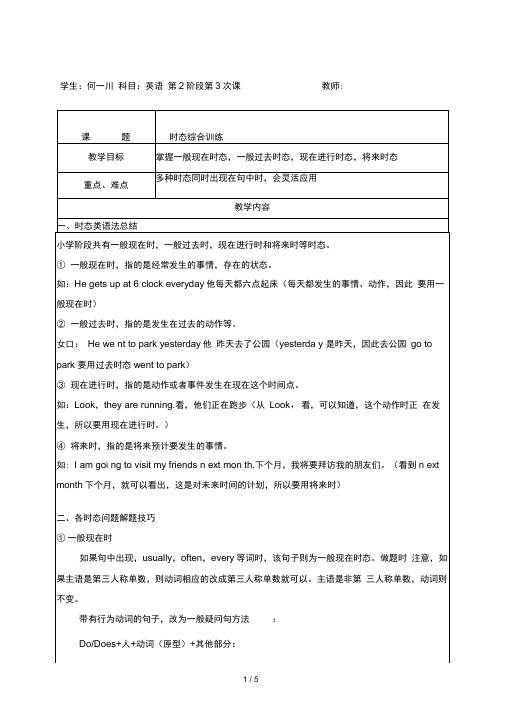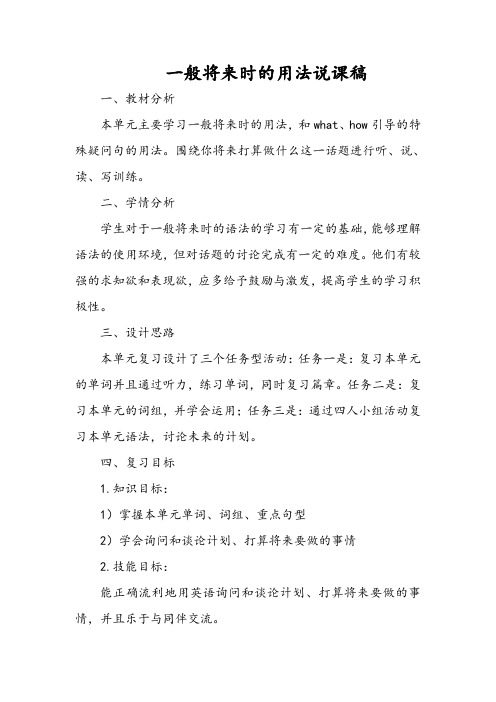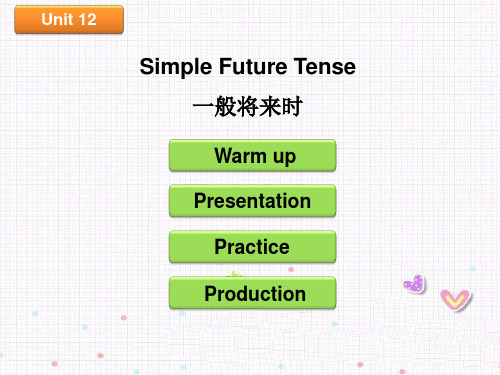四年级下英语语法讲解-一般将来时人教版(pep )
人教版小学英语语法--时态总结(一般现在时-一般过去式-现在进行时-一般将来时)

学生:何一川科目:英语第2阶段第3次课教师:学生:何一川科目:英语第2阶段第3次课教师:带有Be动词的句子,改为一般疑问句的方法:Be+人+其他:He is a good student.-----s he a good student?(第三人称单数用does开头,非第三人称单数用do开头,一二人称互换,l--You,We-You)例题:I usually go to school by bike. --------- Do you usually go to school by bike? (该句人称要互换)He ofte n watches TV on Sundays- ------ D oes he ofte n watch TV on Sun days?They often play football after dinner. ----------- Do they often play football after dinn er?②一般过去时女口果句中出现,last week/last weekend/last month/last year yesterday the day before yesterday X days ago (其中,last是“上一” d的意思,ago是“…前”的意思)等词时,该句子则为一般过去时态。
做题时,只要把动词,改成过去时态。
关键是记忆总结不规贝U动词的过去式。
如:go---went,do---did,swim--swam例题:I visited my grandmother last weekend.They bought a new bike10 days ago.He was ill yesterday.改为一般疑冋句:Did +人+动词(原型)+其他?③现在进行时如果句中出现,look,listen,now等词(看,XX正在做某事;听,XX正在做某事;现在,XX正在做某事)。
一般将来时-小学英语语法

I’m going to steal some shirts and jackets.
Where is the thief?
Where is he?
He is in the CLOTHES SHOP
Where is the thief?
He is in the CLOTHES SHOP
Where is the thief? Where is he?
He is in the BAKERY
Where is the thief?
I’m going to steal some beef and sausages.
Where is the thief?Where is he?
He is in the BUTCHER’S
What are you/they/we going to do ...?
The future with going to is used to express intention.
What is he/she/it going to do?
The future with be going to is used to express a plan for
He is in the NEWSAGENT’S
Where is the thief?
I’m going to steal some sculptures and paintings.
Where is the thief?
Where is he?
He is in the MUSEUM
Where is the thief?
simple future tense 一般将来时
精品课件英语时态学习《一般将来时

精品课件英语时态学习《一般将来时教学内容:本节课的教学内容选自人教版小学英语PEP教材第六册,第三章第三课时,主要学习一般将来时。
本节课通过介绍一般将来时的概念,以及其构成和用法,使学生能够正确运用一般将来时进行日常交流。
教学目标:1. 学生能够理解一般将来时的概念,并能够正确运用一般将来时进行表达。
2. 学生能够通过听力练习和口语练习,提高对一般将来时的听力和口语运用能力。
3. 学生能够通过小组合作和角色扮演,提高团队合作能力和口语表达能力。
教学难点与重点:重点:一般将来时的构成和用法。
难点:一般将来时的运用,特别是在实际情景中的运用。
教具与学具准备:教具:PPT、黑板、粉笔。
学具:课本、练习本、铅笔。
教学过程:一、实践情景引入(5分钟)教师通过展示一个未来的场景,如:“明天我们要去游乐园玩”,引出一般将来时的概念。
二、知识讲解(10分钟)教师在黑板上写出一般将来时的构成:“will + 动词原形”,并解释其用法。
三、例题讲解(10分钟)教师用PPT展示一些一般将来时的例句,如:“I will go to the movies tomorrow.”,并让学生跟读。
四、随堂练习(5分钟)教师给出一些一般将来时的句子,让学生判断其正确与否。
五、小组合作(5分钟)学生分组,每组编写一个一般将来时的对话,并表演出来。
六、角色扮演(5分钟)学生分组,每组选择一个角色,用一般将来时进行表演。
板书设计:一般将来时构成:will + 动词原形用法:表示将来要发生的动作或状态。
作业设计:1. 用一般将来时写一篇关于你未来计划的作文。
答案:I will go to university when I grow up. I will study engineering because I like to solve problems. I will also travel to different countries to learn about different cultures.A: What are you going to do after class?B: ________________________________________A: That sounds fun. I will go to the library to read a book.答案:B: I will go to the playground to play sports.课后反思及拓展延伸:通过本节课的学习,学生应该掌握了一般将来时的构成和用法,并在实际情景中能够正确运用。
最新人教pep版小学英语毕业专项复习——第四部分 时态精析 第四节一般将来时

A. have
B. is having
C. will have
返回目录
( C )5. Oliver: Are you going to the park? Tom: Yes,
_____.
A. he is
B. I will
C. I am
返回目录
三、Ask and answer. 根据答句写问句。 1. A: __W__h_a_t'_s_t_h_e_w__e_a_th_e_r__li_k_e_t_o_m__o_r_ro_w__?__/H__o_w_'_s_t_h_e
返回目录
3. A: __I_s_s_h_e__g_o_in_g__to__c_o_o_k_d__in_n_e_r_?_____ B: Yes,she is going to cook dinner.
4. A: ___W__h__er_e__a_r_e_y_o_u__g_o_in_g_?_________ B: I'm going to Beijing. 5. A: ___W__h_a_t_a_r_e__y_o_u_g_o_i_n_g__to__d_o_?_____
返回目录
二、一般将来时的句型结构 1. be going to结构 (1) 肯定句:主语+be going to+动词原形+其他。 如: I'm going to go fishing this week. 这周我打算去钓鱼。 Tom's father is going to wash the car today. 今天汤姆的爸爸 打算洗车。
返回目录
( A )3. My mother _____ shopping next weekend.
一般将来时的用法说课稿

一般将来时的用法说课稿一、教材分析本单元主要学习一般将来时的用法,和what、how引导的特殊疑问句的用法。
围绕你将来打算做什么这一话题进行听、说、读、写训练。
二、学情分析学生对于一般将来时的语法的学习有一定的基础,能够理解语法的使用环境,但对话题的讨论完成有一定的难度。
他们有较强的求知欲和表现欲,应多给予鼓励与激发,提高学生的学习积极性。
三、设计思路本单元复习设计了三个任务型活动:任务一是:复习本单元的单词并且通过听力,练习单词,同时复习篇章。
任务二是:复习本单元的词组,并学会运用;任务三是:通过四人小组活动复习本单元语法,讨论未来的计划。
四、复习目标1.知识目标:1)掌握本单元单词、词组、重点句型2)学会询问和谈论计划、打算将来要做的事情2.技能目标:能正确流利地用英语询问和谈论计划、打算将来要做的事情,并且乐于与同伴交流。
3.情感目标:本单元谈论的话题是“我要学计算机科技”,学习内容贴近学生的生活。
通过对将来的计划的互相询问和谈论能够了解全班同学的理想。
督促学生做决心,并坚持执行。
五、复习重点:1.重点短语:computer programmer; make resolutions;make promises; at the beginning of the year; have to do with;take up; agree with2.重点句型:What do you want to be when you grow up?I want to be an engineer.How are you going to do that?I’m going to study math really hard.Where are you going to work?I’m going to move to Shanghai.When are you going to start?I’m going to start when I finish high school and college.六、复习难点一般将来时的运用七、教具及电教手段The tape recorder、多媒体课件八、教学过程Step 1 Lead inListen to the song “I want to be a king”设计意图:激发学生的学习兴趣。
小学英语语法课件- 一般将来时 (共36张PPT) 全国通用

Presentation Sentences
She will take swimming lessons in this vacation. 她今年假期要去学游泳。 She is going to go shopping tomorrow. 她明天要去购物。 Jim will open a shop on internet. 吉姆打算要在网络上开个店。 Jim is going to be an actor when he grows up. Jim长大了想当一名演员。
___t_o_m_o_r_ro_w_.____________________________ 一般疑问句:A__re_t_h_e_c_h_il_d_re_n_g_o_i_ng__to__w_a_tc_h_a_d_o_l_p_h_in_s_h_o_w__
t_o_m_o_r_ro_w_?____________________________ There will be a great concert next week. 否定句:_T_h_e_r_e_w_il_l _n_o_t b_e__a_g_re_a_t_c_o_n_ce_r_t _n_ex_t_w_e_e_k_. ______ 一般疑问句:_W_i_ll_th_e_r_e_b_e_a_g_r_e_a_t _co_n_c_e_rt_n_e_x_t_w_e_e_k?______
Practice Oral Practice
小组合作完成单项选择,并朗读句子
( C ) There __________ a meeting tomorrow afternoon.
A. will be going to
B. will going to be
C. is going to be
英语语法一般将来时讲解
英语动词时态详解:一般将来时一、一般将来时的定义一般将来时表示在现在看来即将要发生的动作或存在的状态。
常用时间副词tomorrow, soon或短语next year / week / month, in a few days, in the future, sometime做状语。
如:What will you do this afternoon. 你今天下午干什么?We will have a meeting tomorrow. 我们明天要开会。
He is going to study abroad next year. 明年他要出国学习。
二、一般将来时的构成1.肯定句:主语+will/shall+动词原型(一般shall用于第一人称,will用于各种人称)We shall have a lot of rain next month. 下个月将下很多雨。
I think she will pass the exam. 我想他考试会及格的。
2.否定句:主语+shall/will+not+动词原形We shall not (shan’t)go to China next year.XiaoMing will not(won’t) be back in few days.3.一般疑问句:Shall/Will +主语+动词原形+…?Shall we play volleyball next class? 下一节课我们将打排球吗?—Yes,you will. 是的,你们将.Will you come here next week? 下个星期你将来这儿吗?—Yes,I will. 是的,我将.Will she teach us this term? 这学期,她将教我们吗?—Yes,she will. 是的,她将.4.特殊疑问句:What(When,Where,How...)+will/shall+主语+动词原形+...?What will you do next week?下个星期你将要做什么?—I will do my homework。
小学生英语语法:一般将来时
四. 基本句型 1. 肯定句:主语 + be going to + v.原型+其它 I am going to visit Australia. She is going to buy some clothes.
They are going to play computer games.
2.否定句:在 be / will 后加not
7.Mother ____me a nice presrnt on my next birthday. A. is going to gives B. is going to give C. gives
B
B
8.
B a concert next Satyrday?
A.There is going to be
三. 与一般将来时连用的时间状语 this afternoon / evening, tonight 今 evening )明天… the day after tomorrow 后天 next week / Sunday / month / year下周/… soon 很快 不久 in three days 三天后 in the future 将来
I am not going to visit Australia. She isn’t going to buy some clothes.
3.一般疑问句句:将 be / will 动词提前。 (主语是第一人称I 时,变一般疑问句时 将I 变you) 1)I am going to visit Australia. ---Are you going to visit Australia? ---Yes, I am / No, I am not. 2)She is going to buy some clothes. --Is she going to buy some clothes? --Yes, she is. / No, she is not.
一般将来时知识点总结讲解学习
一般将来时知识点总结讲解学习一般将来时是英语语法中的一种时态,用于表示将来一些时间将会发生的动作或状态。
它常常与表示将来的时间状语连用,如tomorrow(明天)、next week(下周)、in the future(将来)等。
下面是一般将来时的知识点总结和讲解。
一、一般将来时的构成1. 肯定句结构:主语 + will + 动词原形例如:I will go to the park tomorrow.2. 否定句结构:主语 + will not(won't)+ 动词原形例如:She won't watch TV tonight.3. 疑问句结构:Will + 主语 + 动词原形 + 其他?例如:Will you have dinner with us?二、一般将来时的用法1.表示将来的计划、打算或意图例如:They will visit their grandparents next month.2.表示预测、推测或猜测例如:I think it will rain tomorrow.3.表示请求、邀请、建议或命令例如:Will you please pass me the salt?4.表示承诺、威胁或警告例如:I will help you with the project.5.在主句中的时间状语从句中,一般将来时常常用于表示将来的动作或状态。
例如:I will go shopping when I finish my work.三、一般将来时的注意事项1.一般将来时表示先于现在或过去的将来动作或状态,与现在的决定或打算无关。
例如:I will study abroad next year. (现在决定)2. be动词的一般将来时构成为will be,否定形式为will not be (won't be)。
例如:He will be at home tomorrow.3.一般将来时常常与表示将来的时间状语连用。
PEP小学英语一般将来时语法要点及习题
PEP小学英语语法要点及习题---将来时理论及练习一、概念:表示将要发生的动作或存在的状态及打算、计划或准备做某事。
句中一般有以下时间状语:tomorrow, next day(week, month, year…),soon, the day after tomorrow(后天)等。
二、基本结构:①be going to + do;②will+ do.三、否定句:在be动词(am, is, are)后加not或情态动词will后加not成won’t。
例如:I’m going to have a picnic this afternoon.→ I’m not going to have a picnic this afternoon.四、一般疑问句: be或will提到句首,some改为any, and改为or,第一二人称互换。
例如:We are going to go on an outing this weekend. → Are you going to go on an outing this weekend?五、对划线部分提问。
一般情况,一般将来时的对划线部分有三种情况。
1. 问人。
Who 例如:I’m going to New York soon. →Who’s going to New York soon.2. 问干什么。
What … do.例如: My father is going to watch a race with me thisafternoon. →What is your father going to do with you this afternoon.3. 问什么时候。
When.例如:She’s going to go to bed at nine. →When is she goingto bed?六、同义句:be going to = willI am going to go swimming tomorrow(明天). = I will go swimming tomorrow.练习:填空。
- 1、下载文档前请自行甄别文档内容的完整性,平台不提供额外的编辑、内容补充、找答案等附加服务。
- 2、"仅部分预览"的文档,不可在线预览部分如存在完整性等问题,可反馈申请退款(可完整预览的文档不适用该条件!)。
- 3、如文档侵犯您的权益,请联系客服反馈,我们会尽快为您处理(人工客服工作时间:9:00-18:30)。
小学英语语法:一般现在时讲解
一. 意义:表示经常发生的事情,动作或存在的状态
二. 构成及变化
1.be动词的变化。
肯定句:主语+be(am,is,are)+其它。
如:I am a boy.我是一个男孩。
否定句:主语+ be + not +其它。
如:He is not a worker.他不是工人。
一般疑问句:Be +主语+其它。
如:-Are you a student? -Yes. I am. / No, I'm not.
特殊疑问句:疑问词+一般疑问句。
如:Where is my bike?
2. 行为动词的变化。
当主语为第一,二人称及复数时,助动词为do
肯定句:主语+动词原形(+其它)。
如:We often play basketball after school.
否定句:主语+ don't+动词原形(+其它)。
如:we don’t play basketball after school.
一般疑问句:Do +主语+动词原形+其它?
如:Do you often play basketball after school l? Yes, we do. / No, we don't.
特殊疑问句:疑问词+以do开头的一般疑问句?
如:What do you often do after school ?
当主语为第三人称单数时,助动词为does
肯定句:主语+动词三单式(+其它)。
如:He swims well.
否定句:主语+ doesn’t+动词原形(+其它)。
如:He doesn’t swim well..
一般疑问句:Does +主语+动词原形+其它。
如:Does he swim well ? Yes, he does. / No, he doesn't.
特殊疑问句:疑问词+以does开头的一般疑问句?
如:How does your father go to work?
三.第三人称单数的动词变化规则(只有在第三人称为主语的肯定句中,动词才用三单式)
(1)多数动词直接加s:runs gets likes collets takes plays climbs…….
(2)结尾是s, x, sh, ch, o,前为辅音字母,
结尾加es :watches teaches goes does washes crosses mixes brushes
(3)动词末尾y前为辅音:将y改为i加es: study→studies fly→flies
carry→carries cry→cries
但在y前如果为元音则直接加s:buys says
四.时间标志:always , usually , often , sometimes ,every…
现在进行时
一.意义——当表示现在正在进行的动作或正在发生的事。
二.构成:be (am, is ,are )+动词现在分词-ing形式
肯定句:主语+ be + 现在分词V-ing (+ 其他) I’m doing my homework now .
否定句:主语+be+not+动词-ing +其他. I’m not doing my homework now.
一般疑问句:Be+主语+动词-ing +其他?
Are you doing your home work now? Yes, I am . No , I’m not .
特殊疑问句:特殊疑问词+be+主语+动词-ing+其他?What are you doing now ?。
